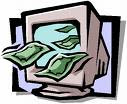Online banking isn't out to change your money habits. It simply uses today's technology to give you the option of bypassing the time-consuming, paper-based aspects of traditional banking in order to manage your finances more quickly and efficiently.
It is almost certainly the way most banking will be conducted in the not-too-distant future.
Benefits of banking online
Whether your bank is a traditional brick and mortar institution or a Web-only bank with no brick and mortar branches, online banking lets you connect to your bank through the Internet and do things such as view your accounts, transfer money between accounts, view images of canceled checks, print copies of those checks and pay bills online. You'll find that it's common for online banking sites to be compatible with money managing programs such as Quicken and Microsoft Money.
Many banks make it easier to manage your checking account by allowing you set up e-mail alerts so you can be notified when checks clear or when your balance slips below a certain level. There is also a detailed listing of your canceled checks.
If you'd like to eliminate paper checks from your life, you'll find that a growing number of companies allow you to make automatic payments through your online banking account.
Getting set up for online bill pay
Getting started is easy. The bank's Web site will walk you through the steps of registering the bills you want to pay and the accounts you want to use to pay them. You'll only have to enter the information once. You can always make changes and add or subtract bills.
If a monthly bill is for the same amount each month, you might want to schedule a recurring payment. If the amount varies from month to month you can pay the bill each month on a "one time" basis.
Set your schedule
Once you have registered the accounts you wish to pay online, the next step is to schedule payments. Your creditors receive your online payment in one of two ways: electronic payment or check. If the company is set up to accept electronic payments, your payment is automatically debited from your account and deposited electronically into their account. If the company can't accept electronic payments, your bank issues a check based on your online payment instructions.
Most bill payment sites include a payment activity page that lists all of your payments and their status -- scheduled, pending or processed.
Be aware that companies sometimes change the billing address or your account number without warning. It's important to check your statement each month to verify those details as well as your transactions.
Security
You'll have a user name and password to access your online account. Just as with any information used to access any other financial account, you should keep these codes secret. Your bank will tell you what to look for -- usually an icon of a locked padlock -- to ensure you're accessing your account over a secure line.
You should also beware of a scam called phishing where crooks send out e-mails that might look exactly like e-mails from your bank. These e-mails often claim that some account or personal information is needed. You're asked to click on a link and fill in the information. As a hard-and-fast rule, never click on a link in an e-mail and then divulge account information. Call your bank -- don't use a phone number supplied in the e-mail -- and ask if the e-mail is legitimate.
Whether you bank online or prefer the old fashioned way, you receive a statement every month that details transactions and account status. In the next section, you'll see why you should take time each month to carefully review your statement.



